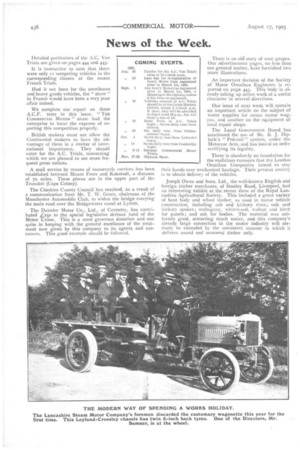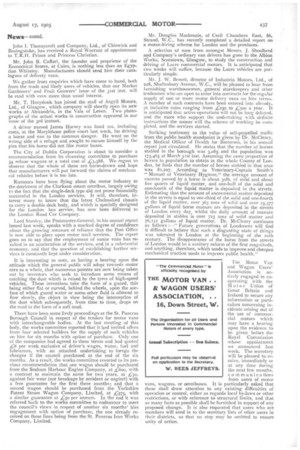News of the Week.
Page 2

Page 3

If you've noticed an error in this article please click here to report it so we can fix it.
Detailed particulars of the A.C. Van Trials are given on Pages 444 and 445.
It is instructive to note that there were only ii competing vehicles in the corresponding classes at the recent French Trials.
Had it not been for the omnibuses and heavy goods vehicles, the " show" in France would have been a very poor affair indeed.
We complete our report on these A.C.F. tests in this issue. " THE cOMMERC1AL MOTOR" alone had the enterprise to incur the expense of reporting this competition properly.
British makers must not allow the Continental makers to have the advantage of them in a matter of international importance. They should enter for the A.C. Trials, concerning which we are pleased to see more frequent press notices.
A mail service by means of motorcycle carriers has been 'established between Mount Prere and Kokstadt, a distance of 70 miles. These places are in the upper part of the Transkei (Cape Colony).
The Cheshire County Council has resolved, as a result of a communication from Mr. T. W. Grace, chairman of the Manchester Automobile Club, to widen the bridge carrying the main road over the Bridgewater canal at Lymm.
The Daimler Motor Co., Ltd., of Coventry, has contributed £250 to the special legislative defence fund of the Motor Union. This is a most generous donation and one quite in keeping with the general excellence of the treatment now given by this company to its agents and customers. This good example should be followed. There is an old story of sour grapes. Our advertisement pages, no less than Our general matter, have furnished two more illustrations.
An important decision of the Society of Motor Omnibus Engineers is reported on page 443. This body is already taking up active work of a useful character in several directions.
Our issue of next week will contain an important article on the subject of water supplies for steam motor wagens, and another oil the equipment of local repair shops.
The Local Government Board has sanctioned the use of Mr. B. J. Diplock's " Ped-rail " system, under the Motorcar Acts, and has issued an order certifying its legality.
There is absolutely no foundation for the malicious rumours that the London Omnibus Companies intend to stay their hands over n echanical haulage. Their present anxiety is to obtain delivery of the vehicles.
Joseph Owen and Sons, Ltd., the well-known English and foreign timber merchants, of Stanley Road, Liverpool, had an interesting exhibit at the recent show of the Royal Lancashire Agricultural Society. This included a great variety of bent body and wheel timber, as used in motor vehicle construction, including ash and hickory rims; oak and hickory spokes ; mahogany, whitewood, walnut and birch for panels; and ash for bodies. The material was uniformly good, attracting much notice, and this company's already large connection in the motor industry will certionly be extended by the consistent manner in which it delivers sound and seasoned timber only. John I. Thornycroft and Company, Ltd., of Chiswick and Basingstoke, has received a Royal Warrant of appointment to T.R. H. Prince and Princess Christian.
Mr. John B. Caffari, the founder and proprietor of the Economical Stores, at Cairo, is nothing less than an Egyptian Whiteley. Manufacturers should send him their catalogues of delivery vans.
We gather from enquiries which have come to hand, both from the trade and likely users of vehicles, that our Market Gardeners' and Fruit Growers' issue of the 3tst inst. will be read with even more than usual interest.
Mr. T. Hooydonk has joined the staff of Argyll Motors, Ltd., of Glasgow, which company will shortly open its new works at Alexandria, in the Vale of Leven. Two photographs of the actual works in construction appeared in our issue of the 3rd instant.
A driver named James Harvey was fined tos. including costs, at the Marylebone police court last week, for driving a horse and van to the common danger. He went on the wrong side of a refuge and sought to excuse himself by the plea that his horse did not like motor buses.
The City of Dublin Corporation is about to consider a recommendation from its cleansing committee to purchase 54 refuse wagons at a total cost of £3,588. We regret to observe that the whole of these are horse-drawn and hope that manufacturers will put forward the claims of mechani cal vehicles before it is too late.
Rumours have been flying about the motor industry to the detriment of the Clarkson steam omnibus, largely owing to the fact that the single-deck type did not prove financially successful in the London services. It will, therefore, interest many to know that the latest Chelmsford chassis to carry a double deck body, and which is specially designed for the London bus service, has now been delivered to the London Road Car Company. • Lord Stanley, the Postmaster-General, in his annual report issued last week, speaks with a marked degree of confidence about the growing measure of reliance that the Post Office is now able to place upon motor mail services. The report goes on to say that the employment of motor vans has resulted in an acceleration of the services, and in a substantial economy, and that the question of establishing further services is constantly kept under consideration.
It is interesting to note, as having a bearing upon the attitude which the general public will adopt towards motor cars as a whole, that numerous patents are now being taken out by inventors who seek to Introduce some means of catching the dust which is raised by the tyres of high-speed vehicles. These inventions take the form of a guard, this being either flat or curved, behind the wheels, upon the surface of which guard water or some other fluid is allowed to flow slowly, the object in view being the interception of the dust which subsequently, from time to time, drops on the road in the form of a soft mud.
There have been some lively proceedings at the St. Pancras Borough Council in respect of the tenders for motor vans with interchangeable bodies. At the last meeting of this body, the works committee reported that it had invited offers from four selected builders for the supply of such vehicles on hire for six months with option of purchase. Only one of the companies had agreed to these terms and had quoted L:8 per week exclusive of driver's wages, water, fuel and lubricants, with an attached undertaking to forego the charges if the council purchased at the end of the six months. As a result, the works committee reverted to its previous recommendation that one wagon should be purchased from the Seaham Harbour Engine Company, at £600, with a contract to maintain the same for two years, at ,:30, against fair wear (not breakage by accident or neglect) with a free guarantee for the first three months; and that a second wagon should be purchased from the Yorkshire Patent Steam Wagon Company, Limited, at .575, with a similar guarantee at ,4'so per annum. In the end it was referred back to the works committee to endeavour to meet the council's views in respect of another six months' hire engagement with option of purchase, the one already received on these lines being from the St. Pancras Iron Works Company, Limited.
Mr. Douglas Mackenzie, of Cecil Chambers East, 86, Strand, W.C., has recently completed a detailed report on a motor-hiring scheme for London and the provinces.
A selection of men from amongst Messrs. J. Shoolbred and Company's ordinary van drivers has gone to the Albion Works, Seotstown, Glasgow, to study the construction and driving of Lacre commercial motors. It is anticipated that two weeks will suffice, because the Lacre vehicles are particularly simple.
Mr. J. W. Ilenett, director of Industria Motors, Ltd., of 228, Shaftesbury Avenue, W.C., will be pleased to hear from furnishing warehousemen, general storekeepers and other tradesmen who are open to enter into contracts for the regular supply of one or more motor delivery vans on hire terms. A number of such contracts have been entered into already, at inclusive rates ranging from Z.25o to ,30m0 a year. It is anticipated that active operations will not be long delayed, and the more who support the undertaking with definite instructions the sooner will the scheme of working be completed, and the services started.
Striking testimony to the value of self-propelled traffic from the public health standpoint is given by Dr. McCleary, the Medical Officer of Health for Battersea, in his annual report just circulated. He states that the number of horses stabled in the borough was 3,065 and the population was 175,465 at March 31st last. Assuming the same proportion of horses to population to obtain in the whole County of London, he finds that the number of horses stabled in that area was 81,207. According to Veterinary-Captain Smith's " Manual of Veterinary Hygiene," the average amount of excreta passed by a horse is about 3o1b. of solid and about five quarts of liquid matter, and one-half of the solid and one-fourth of the liquid matter is deposited in the streets. Estimating that the amount of excremental matter deposited in the streets is equal to one-third of the solid and one-fourth of the liquid matter, over 363 tons of solid and over 25,377 gallons of liquid horse manure are deposited in the streets of London every day, whilst the daily amount of manure deposited in stables is over 725 tons of solid matter and 76,131 gallons of liquid matter. Dr. McCleary continues as follows :—" Future generations of Londoners will find it difficult to believe that such a disgusting state of things was tolerated in London at the beginning of the 20th century. The disappearance of the horse from the streets of London would be a sanitary reform of the first magnitude, and anything, therefore, which tends to improve and cheapen mechanical traction tends to improve public health."
The Motor Van and Wagon Users' Association is actively engaged in cooperating with the Motor Union of Great Britain and Ireland to secure any information or particulars concerning incidents arising out of the use of commercial motors which may have a bearing upon the evidence to be given before the Royal Commission whose appointment we announced last week. The secretary will be pleased to receive, immediately or at any time during the next few months, C ommunications from users of motor vans, wagons, or omnibuses. It is particularly asked that these shall draw attention to any existing difficulties of operation or control, either as regards local by-laws or other restrictions, or with reference to structural limits, and that as many facts as possible shall be furnished in support of any proposed change. It is also requested that users who are members will send in to the secretary lists of other users in their districts, so that no step may be omitted to ensure unity of action.
















